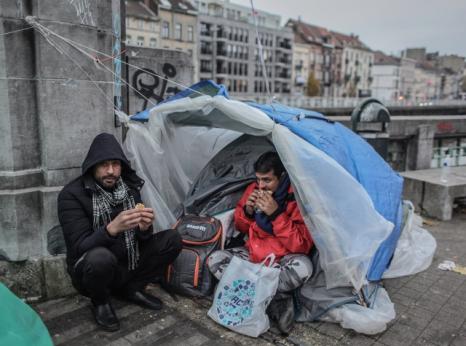Belgium: Asylum Seekers Denied Shelter

The Belgian government has repeatedly failed to provide adequate accommodation to asylum seekers and refused to increase reception places to meet the needed capacity. In so doing, authorities have created a self-inflicted crisis that has left thousands of asylum seekers sleeping in the cold in violation of their human rights.
On 19 October 2021, 50 people were denied shelter whilst applying for asylum at Brussels’ asylum registration centre. As a result, they started camping outside of the centre. Since then, thousands more were abandoned on the streets after they applied for asylum. They were only provided with shelter after waiting for several months of living in the streets, makeshift camps or squats, or shelter offered by organisations. The authorities have carried out forced evictions against asylum seekers camping on the street or in squats, with no alternative accommodation provided. In at least one case, the police destroyed makeshift tents made from cardboard and other materials, set up near the registration centre, leaving people entirely without shelter. Several informal settlements have emerged in Brussels, notably one located in Rue des Palais, which served as a shelter for approximately 1,000 people. Belgian media and NGOs reported that the living conditions within this settlement were dire, with limited access to food provision, clean water, and sanitation. Belgian medical NGOs reported the presence of infectious diseases such as scabies and diphtheria. The ‘palais des droits’ settlement, as it was ironically called, was cleared out by the police in February 2023. More squats and informal settlements developed in the following months, and the authorities proceeded to clear them out, sometimes providing no alternative accommodation for all or some of the asylum seekers.
In August 2023, the Belgian State Secretary for Asylum and Migration decided to temporarily halt reception for all single men applying for asylum, ostensibly to protect spaces for families with children. The measure was suspended by Belgium's highest administrative court which stated that the law" "does not allow the [government] to deprive a category of asylum seekers […] of the right to reception in order to resolve the difficulties it claims to be facing." In response to the ruling, the State Secretary announced that she would ignore the decision and continue to implement the suspension for single men.
Currently, the suffering of destitute asylum seekers is only alleviated thanks to the invaluable work of Belgian NGOs, activists and other organisations. However, the capacity of civil society organisations is limited. Although the government has increased Belgium’s reception capacity, the measures taken have been too slow and insufficient to solve a self-inflicted reception crisis. Already in 2021, civil society organisations warned that action was needed to increase reception capacity, to avoid people being denied shelter. Despite such warnings, the government failed to take appropriate measures to deal with the situation.
Thousands of court decisions, including those by the Belgian Council of State and the European Court of Human Rights, have recognised that Belgian institutions violated their obligations to adequately assist asylum seekers. By failing to comply with the rulings, the government has shown a shocking contempt for not just the rights of asylum seekers, but also the rule of law.
Before 2021, Belgian reception shelters had approximately 28,000 beds. The current count stands at approximately 34,000 beds. When Belgium was confronted with a larger than anticipated number of individuals seeking international protection in 2015, a so called ‘dispersal plan’ was put in place by Royal Decree 2016000341 of 17 May 2016. Belgium’s legislation now explicitly stipulates that “[t]o ensure a balanced distribution of reception places among municipalities”, the government can determine the criteria for the mandatory distribution of reception places. Civil society organisations have advocated for the activation of the dispersal plan since 2022. The activation of the dispersal plan would result in additional reception capacity being provided across municipalities, putting an end to the current reception crisis.